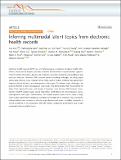Inferring multimodal latent topics from electronic health records
Author(s)
Li, Yue; Nair, Pratheeksha; Lu, Xing Han; Wen, Zhi; Wang, Yuening; Dehaghi, Amir Ardalan Kalantari; Miao, Yan; Liu, Weiqi; Ordog, Tamas; Biernacka, Joanna M; Ryu, Euijung; Olson, Janet E; Frye, Mark A; Liu, Aihua; Guo, Liming; Marelli, Ariane; Ahuja, Yuri; Davila-Velderrain, Jose; Kellis, Manolis; ... Show more Show less
DownloadPublished version (3.898Mb)
Publisher with Creative Commons License
Publisher with Creative Commons License
Creative Commons Attribution
Terms of use
Metadata
Show full item recordAbstract
© 2020, The Author(s). Electronic health records (EHR) are rich heterogeneous collections of patient health information, whose broad adoption provides clinicians and researchers unprecedented opportunities for health informatics, disease-risk prediction, actionable clinical recommendations, and precision medicine. However, EHRs present several modeling challenges, including highly sparse data matrices, noisy irregular clinical notes, arbitrary biases in billing code assignment, diagnosis-driven lab tests, and heterogeneous data types. To address these challenges, we present MixEHR, a multi-view Bayesian topic model. We demonstrate MixEHR on MIMIC-III, Mayo Clinic Bipolar Disorder, and Quebec Congenital Heart Disease EHR datasets. Qualitatively, MixEHR disease topics reveal meaningful combinations of clinical features across heterogeneous data types. Quantitatively, we observe superior prediction accuracy of diagnostic codes and lab test imputations compared to the state-of-art methods. We leverage the inferred patient topic mixtures to classify target diseases and predict mortality of patients in critical conditions. In all comparison, MixEHR confers competitive performance and reveals meaningful disease-related topics.
Date issued
2020Department
Massachusetts Institute of Technology. Computer Science and Artificial Intelligence LaboratoryJournal
Nature Communications
Publisher
Springer Science and Business Media LLC